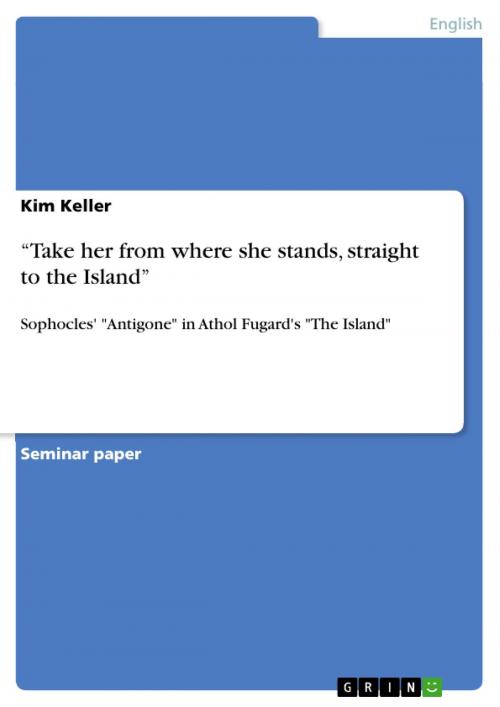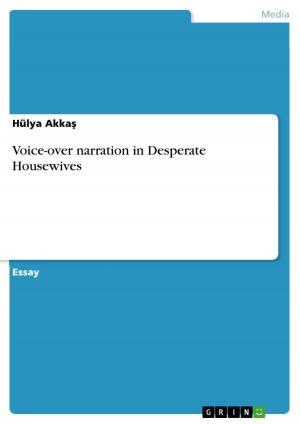'Take her from where she stands, straight to the Island'
Sophocles' 'Antigone' in Athol Fugard's 'The Island'
Fiction & Literature, Literary Theory & Criticism, British| Author: | Kim Keller | ISBN: | 9783656104667 |
| Publisher: | GRIN Publishing | Publication: | January 18, 2012 |
| Imprint: | GRIN Publishing | Language: | English |
| Author: | Kim Keller |
| ISBN: | 9783656104667 |
| Publisher: | GRIN Publishing |
| Publication: | January 18, 2012 |
| Imprint: | GRIN Publishing |
| Language: | English |
Seminar paper from the year 2011 in the subject English Language and Literature Studies - Literature, grade: 3,0, University of Bonn (Institut für Anglsitik, Amerikanistik und Keltologie), course: Hauptseminar 'Literature from South Africa', language: English, abstract: Introduction The concept of intertextuality has been in use since the 1960s. Since then the concept has undergone some changes, in name as well as in content and definition. The first one, who mentioned an intertextuality-like concept was Mikhail Bakhtin. His theory was called dialogism and it was quite similar to the theory of intertextuality as it is defined today. Later on Julia Kristeva built her own theory with reference to Bakhtin. Her concept was more or less a reshaped and renamed form of Bakhtin's one. It was Kristeva who coined the term intertextuality for her concept in the late 1960s. Since then the forerunners of the theory of intertextuality have been redefined time and again. As to this day many different forms of the theory are in use which differ primarily in the extent to which they consider something written - or spoken for that matter - as a text that influences other texts. In order to develop a concept which should underlie this term paper the author will first of all give a short overview of both Bakhtin's and Kristeva's concepts of dialogism and intertextuality. Furthermore, a few of the various concepts that are in use will be named and defined, including Gerald Genette's theory of transculturality, in order to give the reader with a concise overview of the current state of research and to enable them to draw their own conclusions concerning intertextuality. The author will then present Manfred Pfister and Ulrich Broich's theory of intertextuality, which will be the theory that is mostly used for this term paper. In order to provide the reader with some knowledge of Sophocles' Antigone the tragedy will curtly be summarised along with few historical and commentary remarks, thus enabling the reader to draw parallels between Antigone and The Island. This will be followed by a close chronological analysis of occurring intertextual hints, starting with the first mentioning of the Sophoclean play and ending with a close comparison of the prison concert's performance with Antigone. Moreover, the author will try to propose reasons for the choice of Antigone as a pretext while identifying intertextuality. To conclude, the primary insights will be summarised and combined with Pfister and Broich's categories of intertextuality.
Seminar paper from the year 2011 in the subject English Language and Literature Studies - Literature, grade: 3,0, University of Bonn (Institut für Anglsitik, Amerikanistik und Keltologie), course: Hauptseminar 'Literature from South Africa', language: English, abstract: Introduction The concept of intertextuality has been in use since the 1960s. Since then the concept has undergone some changes, in name as well as in content and definition. The first one, who mentioned an intertextuality-like concept was Mikhail Bakhtin. His theory was called dialogism and it was quite similar to the theory of intertextuality as it is defined today. Later on Julia Kristeva built her own theory with reference to Bakhtin. Her concept was more or less a reshaped and renamed form of Bakhtin's one. It was Kristeva who coined the term intertextuality for her concept in the late 1960s. Since then the forerunners of the theory of intertextuality have been redefined time and again. As to this day many different forms of the theory are in use which differ primarily in the extent to which they consider something written - or spoken for that matter - as a text that influences other texts. In order to develop a concept which should underlie this term paper the author will first of all give a short overview of both Bakhtin's and Kristeva's concepts of dialogism and intertextuality. Furthermore, a few of the various concepts that are in use will be named and defined, including Gerald Genette's theory of transculturality, in order to give the reader with a concise overview of the current state of research and to enable them to draw their own conclusions concerning intertextuality. The author will then present Manfred Pfister and Ulrich Broich's theory of intertextuality, which will be the theory that is mostly used for this term paper. In order to provide the reader with some knowledge of Sophocles' Antigone the tragedy will curtly be summarised along with few historical and commentary remarks, thus enabling the reader to draw parallels between Antigone and The Island. This will be followed by a close chronological analysis of occurring intertextual hints, starting with the first mentioning of the Sophoclean play and ending with a close comparison of the prison concert's performance with Antigone. Moreover, the author will try to propose reasons for the choice of Antigone as a pretext while identifying intertextuality. To conclude, the primary insights will be summarised and combined with Pfister and Broich's categories of intertextuality.















